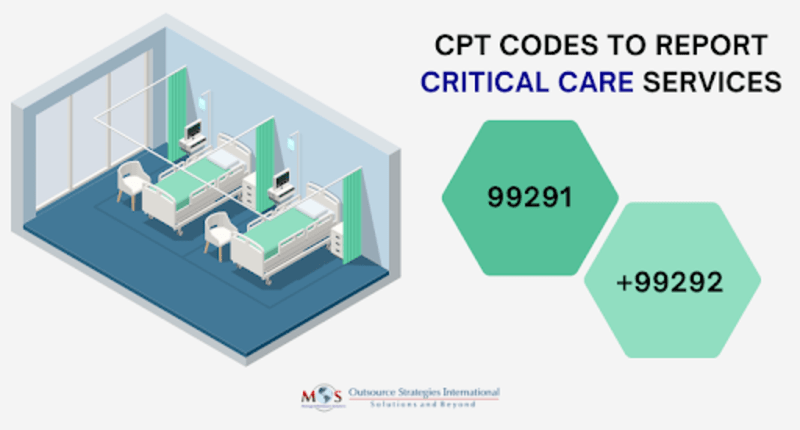Critical care medicine specialists are responsible for diagnosing and treating a diverse range of diseases. Caring for critically ill patients requires a multidisciplinary team approach. However, reporting critical care services can be challenging due to the complex rules and regulations involved. As a medical billing and coding company, we stay current on these guidelines to ensure that clients’ services are reported correctly on claims.
Both Medicare and commercial payers closely examine how critical care services are billed. Accurate and detailed documentation is essential when reporting these services. Proper documentation not only ensures appropriate reimbursement but also helps convey the complexity and intensity of the care provided.

Definition of Critical Care Services
Medicare’s guidelines now align with the CPT’s definition of critical care, which states that it involves the care of a critically ill or injured patient with acute impairment of one or more vital organ systems, resulting in a high probability of imminent or life-threatening deterioration. Additionally, critical care requires complex decision-making to address single or multiple vital organ system failures and to prevent further life-threatening deterioration (Physicians Practice, 2023).
Critical care services can be provided by physicians and non-physician practitioners (NPPs), including nurse practitioners (NPs), physician assistants (PAs), certified nurse specialists (CNSs), and certified nurse midwives (CNMs). In 2022, CMS specified that critical care services may be reported by a physician or non-physician practitioner (NPP) who is a QHP. According to CMS, a QHP is “an individual who is qualified by education, training, licensure/regulation (when applicable), facility privileging (when applicable),” working within their scope of practice. Medicare acknowledges that PAs can directly bill under their own National Provider Identifier (NPI) and receive direct payment for their professional services. It is important to ensure that each provider is properly credentialed to deliver services within the hospital where they are treating patients.
Reporting Critical Care Services
Since critical care services are time-based, it’s crucial to document the total time spent providing direct critical care to the patient. In 2024, a significant number of CPT updates are related to time-based codes.
There are two CPT codes to report critical care services:
99291 Critical care, evaluation and management of critically ill or critically injured patient; first 30-74 minutes.
+99292 Critical care, evaluation and management of critically ill or critically injured patient; each additional 30 minutes (list separately in addition to code for primary services).
These codes report the total duration of critical care time (continuous or aggregated) provided by the physician or other QHP for a given date of service. Time spent performing separately reportable procedures or services should not be included in the time reported as critical care time.
Though the CPT Panel changed the code descriptors for office and hospital E/M codes in 2024 to include a minimum time for reporting the code instead of a time range, the critical care code (99291, 99292) descriptors continue to include time ranges. The following chart from the American College of Surgeons January 2024 Bulletin highlights the CPT and Medicare reporting guidelines for these services:
CPT vs. Medicare Reporting for Critical Care Services
| Total Duration of Critical Care Services | CPT Reporting Instructions | Medicare Reporting Instructions |
| Less than 30 minutes | 99221, 99231-99233 as appropriate | 99221-99231, 99231-99223 as appropriate |
| 30-74 minutes | 99291 x 1 | 99291 x 1 |
| 75-104 minutes | 99291 x 1 and 99292 x 1 | 99291 x 1 |
| 105-134 minutes | 99291 x 1 and 99292 x 2 | 99219 x 1 and 99292 x 1 |
| 135-164 minutes | 99291 x 1 and 99292 x 3 | 99291 x 1 and 99292 x 2 |
| 165 minutes or longer | 99291 and 99292
using guidelines above |
99291 and 99292
using guidelines above |
Source: ACS Bulletin, January 10, 2024
Services Included in Critical Care
CPT 2022 bundled several services into critical care services, making them not separately payable when furnished concurrently with critical care. Do not report these services in addition to the critical care service codes.
Bundled services include:
- Interpretation of cardiac output measurements (93561, 93562)
- Chest X-rays (71045, 71046)
- Pulse oximetry (94760-94762)
- Blood gases and collection and interpretation of physiologic data (e.g., ECGs, blood pressures, hematologic data)
- Gastric intubation (43752, 43753)
- Temporary transcutaneous pacing (92953)
- Ventilator management (94002-94004, 94660, 94662)
- Vascular access procedures
All services need to be sufficiently documented to determine the role each practitioner plays in the treatment of the patient’s care. It is important to report the time spent performing separately reportable procedures or services separately, and not include it in the time reported as critical care time.
Billing Critical Care Services – Key Points
- Critical care services can be provided over multiple days and are usually administered in a dedicated critical care area, such as an intensive care unit or emergency department. The nature of critical care requires the undivided attention of the physician or NPP. Consequently, while delivering critical care services during a specific time period, the practitioner cannot attend to any other patient simultaneously.
- The services can be billed for the total accumulated time spent on a single date, regardless of whether the time is continuous or non-continuous. If the services extend beyond midnight and are provided continuously, the physician or NPP will report the total units of time without interruption. However, it’s important to note that any disruption in the service will result in a new initial service being reported.
- If a patient receives both critical care services and another evaluation and management (E/M) visit on the same calendar date, billing for both services is possible, irrespective of the specialty or group affiliation of the practitioner. The medical record documentation should support that all elements and requirements for the codes and separate reimbursement for both visits are met:
- The other E/M visit was conducted before the critical care services when the patient did not require critical care.
- The services provided were medically necessary.
- The services were distinct and separate, with no overlapping elements from the critical care services furnished later in the day. In these situations, modifier 25 should be appended to the hospital visit codes.
- Physicians or NPPs within the same specialty and group can deliver concurrent follow-up care, including subsequent critical care visits following another practitioner’s critical care visit. If the initial critical care service is provided in full by one practitioner and reported with CPT code 99291, any additional practitioner(s) within the same specialty and group who provide care concurrently to the same patient on the same date should report their time using 99292 for subsequent time intervals.
- Concurrent critical care services can be provided by multiple practitioners of different specialties, regardless of their group affiliation, as long as the services meet the critical care definition, are medically necessary, and do not duplicate other services. The 2022 Medicare Physician Fee Schedule (MPFS) final rule states: “The reasonable and necessary services of each physician rendering concurrent care could be covered where each is required to play an active role in the patient’s treatment.”
- If one practitioner initiates the initial critical care service but does not meet the necessary time threshold to report CPT code 99291, another practitioner within the same specialty and group can take over and continue delivering critical care to the same patient on the same date. The total time spent by the practitioners is totaled to meet the time required to report the 99291. CPT code 99292 can only be reported by a practitioner within the same specialty and group if an additional 30 minutes of critical care services have been provided to the same patient on the same date (74 minutes + 30 minutes = 104 total minutes).
- When it comes to split/shared services, critical care visits may be furnished as split (or shared) visits between a physician and a physician or NPP (CMS, 2022). Split/shared critical care billing requires the reporting provider to have performed over 50% of the total time spent by the physician and NPP. To bill a split/shared critical care service, the billing practitioner should add Modifier FS (for a split/shared E/M visit) to the critical care code on the claim. Additionally, it’s important to note that when multiple providers jointly meet or discuss the patient during a critical care service, the time can only be counted once.
-
- Critical care services can be separately paid in addition to a procedure with a global surgical period if the critical care is unrelated to the procedure. Preoperative and postoperative critical care can be billed if the patient is critically ill and requires the full attention of the physician, and if the care is distinct from and unrelated to the surgical procedure performed. The physician’s documentation should clearly indicate the separate nature of the critical care service.
Modifier 24 (Unrelated evaluation and management service) or modifier FT (Unrelated evaluation and management visit) should be used when billing critical care services to indicate that the critical care was unrelated to the procedure. Modifier FT is mandatory on claims starting from March 1, 2022.
If critical care is performed in the postoperative period by a provider other than the surgeon, a modifier is not required. However, if the care is fully transferred from the surgeon to an intensivist and the critical care is unrelated, modifiers 54 (Surgical care only) and 55 (Postoperative management only) must be reported, as stated by CMS in the final rule.
Medical Record Documentation
When reporting critical care services, practitioners must document:
- Services performed.
- Total time.
- The distinct role of each specialty furnishing critical care in the patient care and conditions.
- Medical necessity.
- For split/shared critical care visits:
- The practitioners involved.
- Relative time spent by each.
- Shared/overlapping time (which can only be counted once).
- Services performed.
- Time spent in the performance of other services reported separately to show this time was not counted towards the critical care visit.
Source: Moda Health
Providers need to be familiar with Medicare and private payer rules and policies on billing critical care services. It is also critical to avoid over utilization and unbundling services inappropriately, billing for critical care when the patient does not meet the critical care definition, and other high-risk coding behavior. Partnering with a competent provider of critical care medical coding services is a feasible option to ensure accurate and thorough documentation of these services for optimal reimbursement.


Ensure accurate reimbursement and compliance with our expert medical billing services.





